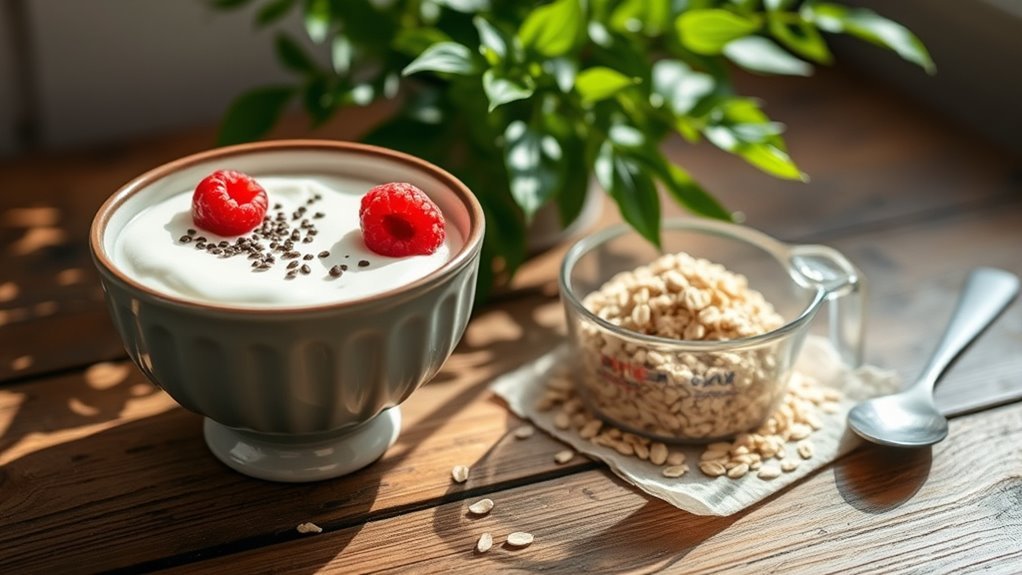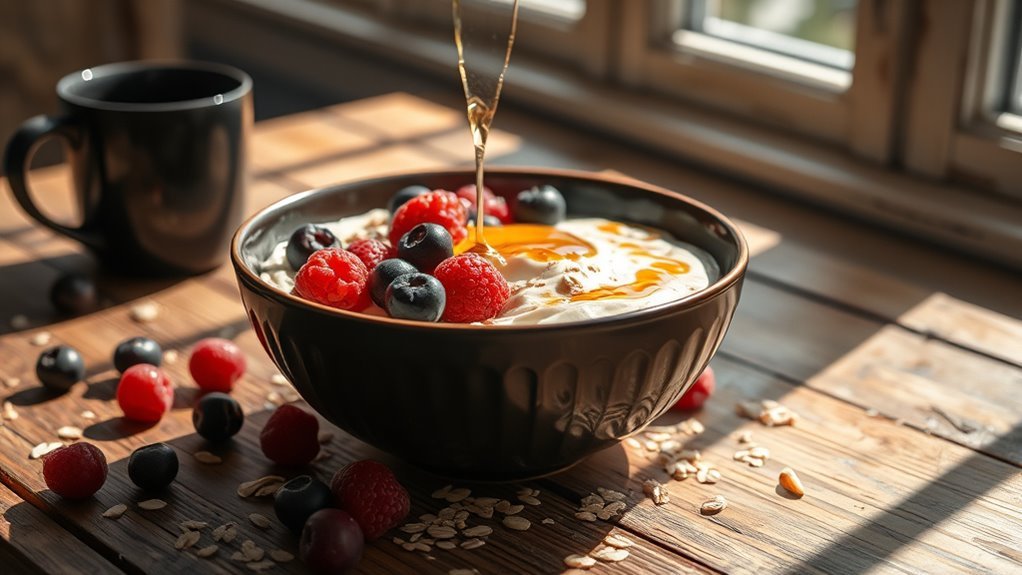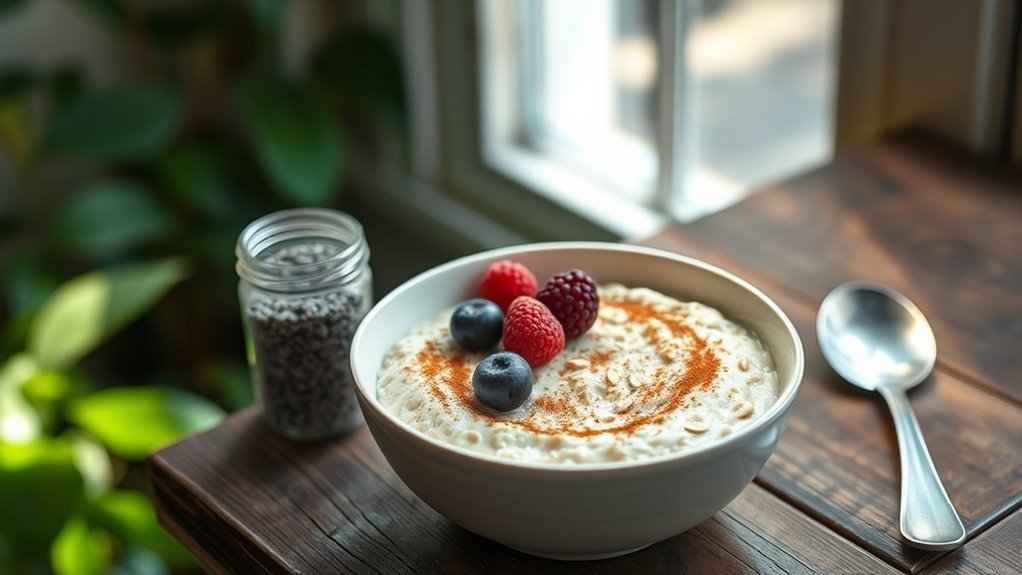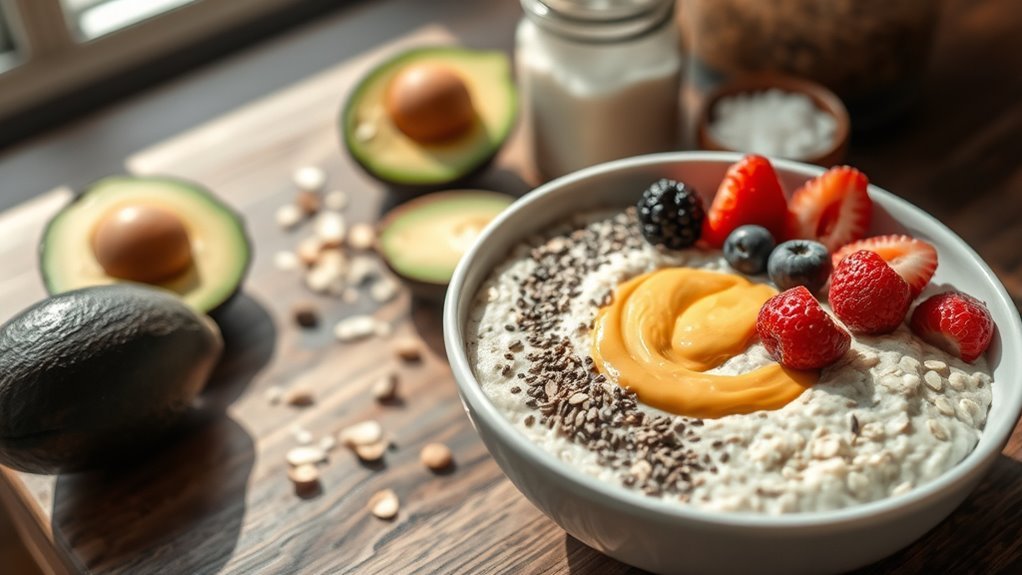Yes, you can eat oats on a keto diet, but it requires careful portion control due to their high carbohydrate content. Rolled oats contain about 27 grams of carbs per 100 grams, which can greatly impact your daily limit. Opt for smaller servings or consider steel-cut oats and oat bran, which have lower net carbs. Combining oats with healthy fats can enhance their nutritional value. There are also plenty of keto-friendly alternatives to explore for your breakfast options.
Understanding the Keto Diet Basics

When you think about the keto diet, it’s essential to understand its fundamental principles. This low-carb, high-fat diet aims to shift your body into a state of ketosis, where it burns fat for fuel instead of carbohydrates. You’ll likely face dietary restrictions that limit your carb intake to around 20-50 grams per day. This means you’ll need to carefully choose your foods to maintain this balance. Emphasizing healthy fats and moderate protein sources can help you achieve your health goals while enjoying a variety of foods. It’s important to listen to your body and consult health professionals as you navigate these changes. Understanding these basics is vital for making informed choices that align with your lifestyle and dietary preferences, especially considering that limiting carbs is crucial for success in achieving ketosis.
Carbohydrate Content of Oats

When considering oats on a keto diet, it’s essential to understand their carbohydrate content. Different types of oats have varying carb counts, and knowing the breakdown can help you make informed choices. Additionally, grasping the concept of net carbs will aid you in fitting oats into your meal plan, if that’s what you choose to do.
Oat Types Comparison
Although oats are often praised for their health benefits, not all types are created equal, especially when it relates to carbohydrate content. When you explore the oat texture comparison, you’ll find rolled oats and steel-cut oats offer a heartier bite, while instant oats are softer and quicker to prepare. This variety affects not only the cooking time but also how they fit into your dietary preferences. In terms of flavor profiles, steel-cut oats have a nuttier taste, while rolled oats are milder and more versatile. If you’re considering oats on a keto diet, it’s essential to know how these factors influence their carbohydrate content and overall suitability for your lifestyle. Choose wisely to maintain your desired nutritional balance.
Carb Count Breakdown
Understanding the carbohydrate content of oats is key for anyone on a keto diet. Oats, particularly rolled oats, contain about 27 grams of carbs per 100 grams. However, they also offer oat fiber, which can be beneficial for digestion and may help in feeling fuller. When you’re looking to enjoy oats while staying keto-friendly, consider limiting your portion size and opting for oatmeal toppings that are low in carbs, like nuts or seeds. These toppings not only add flavor but can also help balance the overall carbohydrate intake. Keep in mind that moderation is essential, as even small servings of oats can add up quickly, potentially pushing you out of ketosis. Being informed will empower your dietary choices.
Net Carbs Explained
While oats are often considered a healthy grain, their carbohydrate content can be a concern for those following a keto diet. To understand this, you need to look at net carbs—the total carbohydrates minus fiber content. Oats are relatively high in carbs, with one cup of cooked oats containing about 27 grams of total carbs. However, they also provide around 4 grams of fiber, which means you’re left with about 23 grams of net carbs per serving. For someone on a keto diet, aiming for a daily limit of 20-50 grams of net carbs, that can take up a significant portion of your allowance. If you’re craving oats, consider portion size and balance it with other low-carb foods throughout your day. Additionally, the role of carbohydrates in a ketogenic diet emphasizes minimal intake, making it essential to monitor your overall carb consumption closely.
Nutritional Profile of Oats

When considering the nutritional profile of oats, you’ll find that they offer a rich source of essential nutrients, making them a popular choice for many diets. Oats are packed with fiber, particularly beta-glucan, which can contribute to heart health and improved digestion. You’ll also benefit from important vitamins and minerals, such as magnesium, iron, and B vitamins. When it comes to oat preparation methods, you can enjoy them in various forms, like oatmeal or overnight oats, tailoring them to your taste. While oats boast numerous oat health benefits, their carbohydrate content can be a concern for those on a keto diet. Understanding how oats fit into your overall dietary goals is vital for maintaining your desired lifestyle.
Impact of Oats on Ketosis
Oats can complicate your efforts to maintain ketosis due to their relatively high carbohydrate content. While they offer some health benefits, the ketosis effects can be significant if you consume them in large amounts. Here’s what you should know about oat nutrition and its impact:
- A 1-cup serving of cooked oats has around 27 grams of carbs.
- This can easily exceed your daily carb limit on a keto diet.
- High carb intake can kick you out of ketosis, hindering your progress.
- Consider alternatives like chia seeds or flaxseeds, which are lower in carbs.
- Monitoring overall daily carb intake is essential to maintaining ketosis while considering your food choices.
While oats are nutritious, balancing their intake is essential for staying in ketosis. Always evaluate how they fit into your overall dietary goals.
Potential Benefits of Oats
Although incorporating oats into a keto diet can be challenging due to their carbohydrate content, they do offer several potential health benefits that are worth considering. Oats are known for their impressive fiber content, particularly beta-glucan, which can help improve gut health and lower cholesterol levels. This fiber can also keep you feeling full longer, potentially aiding in weight management. Additionally, oats contain antioxidants that may reduce inflammation and promote heart health. They’re also a good source of vitamins and minerals, including magnesium, iron, and B vitamins. If you’re seeking to balance your diet while enjoying the benefits of oats, consider portion control or experimenting with different cooking methods to maximize their health benefits without compromising your keto goals.
Keto-Friendly Alternatives to Oats
For those following a keto diet, finding suitable alternatives to oats can help maintain nutritional balance without exceeding carbohydrate limits. Thankfully, there are plenty of delicious options to contemplate. Here are some keto-friendly alternatives that can satisfy your breakfast cravings:
- Keto oatmeal made from chia seeds or flaxseeds, providing a satisfying texture.
- Almond flour porridge, which offers a nutty flavor and is low in carbs.
- Coconut flour pancakes, perfect for a sweet start to your day.
- Low carb granola that combines nuts, seeds, and healthy fats for a crunchy snack.
These alternatives not only keep you within your carb limits but also offer a variety of flavors and textures to enjoy. Moreover, exploring keto baking techniques can enhance the taste and satisfaction of your breakfast options. You can have your breakfast freedom while staying keto!
Low-Carb Breakfast Ideas
If you’re looking for low-carb breakfast ideas that fit your keto lifestyle, there are plenty of options to contemplate. You might want to explore keto-friendly alternatives to oats, as well as savory dishes that can kickstart your day. Plus, easy low-carb recipes can make your morning routine both nutritious and satisfying. When considering breakfast options, keep in mind that carbohydrate content plays a significant role in maintaining ketosis.
Keto-Friendly Oat Alternatives
When you’re on a keto diet, finding satisfying breakfast options can feel challenging, especially if you’re used to starting your day with oats. Fortunately, there are plenty of oatmeal substitutes that can keep your mornings enjoyable without sacrificing your dietary goals. Here are some tasty low-carb grain alternatives:
- Chia Seed Pudding: Packed with fiber and omega-3s, it’s a filling option.
- Flaxseed Meal: Mix it with almond milk for a hearty porridge.
- Coconut Flour Porridge: A great low-carb base that can be flavored to your liking.
- Psyllium Husk: This fiber-rich ingredient can create a unique, oatmeal-like texture.
These keto-friendly options will help you start your day right while staying true to your low-carb lifestyle! Incorporating low-carb vegetables into your meals can further enhance your nutritional intake on a keto diet.
Savory Breakfast Options
While many people associate breakfast with sweet options like pancakes or cereals, savory dishes can offer satisfying and nutritious alternatives that fit perfectly into a low-carb lifestyle. Consider savory oatmeal made from low-carb ingredients like cauliflower or zucchini. You can customize it with keto toppings such as avocado, cheese, or sautéed spinach to enhance flavor and nutrition. Another great option is an omelet filled with veggies and your choice of protein, which keeps you full and energized. You might also try a breakfast bowl with Greek yogurt, nuts, and seeds for added crunch and healthy fats. Embracing these savory options not only diversifies your breakfast but also aligns with your keto goals, allowing you the freedom to enjoy delicious meals while maintaining your carb limits for effective dietary planning.
Easy Low-Carb Recipes
Exploring savory breakfast options opens the door to a variety of easy low-carb recipes that can keep your morning meals interesting and nutritious. Here are some simple ideas for your low-carb breakfast that also make for easy meal prep:
- Egg muffins: Whip up a batch with eggs, cheese, and your favorite veggies for quick snacks throughout the week.
- Avocado toast (on low-carb bread): A satisfying way to enjoy healthy fats and fiber.
- Chia seed pudding: Mix chia seeds with almond milk and let it sit overnight for a delicious, nutritious treat.
- Zucchini pancakes: Combine grated zucchini with eggs and spices for a tasty, low-carb alternative.
These recipes not only fit your keto lifestyle but also offer the freedom to enjoy delicious breakfasts daily! Incorporating whole, nutrient-dense foods into your breakfast routine can further enhance your energy levels and support ketosis.
Tips for Incorporating Oats Into a Keto Diet
Although oats are typically high in carbohydrates, there are ways to incorporate them into a ketogenic diet with careful planning. Start by choosing smaller portions to maintain carb limits. Opt for steel-cut oats or oat bran, which have lower net carbs compared to instant oats. You can also combine oats with healthy fats, like coconut oil or nut butter, to create satisfying keto snacks.
Here’s a quick comparison of oat types:
| Oat Type | Net Carbs (per 1/4 cup) |
|---|---|
| Steel-Cut Oats | 24g |
| Rolled Oats | 27g |
| Oat Bran | 14g |
Experiment with low-carb oatmeal recipes by adding spices or nuts for flavor without excessive carbs.
Recipes for Keto-Friendly Oat Alternatives
If you’re looking for delicious alternatives to oats while sticking to your keto diet, chia seed pudding and flaxseed meal cereal are great options. Chia seeds offer a rich source of fiber and healthy fats, making them a filling choice. Meanwhile, flaxseed meal can provide essential omega-3 fatty acids and can easily be turned into a satisfying cereal. Additionally, incorporating low-carb alternatives like berries can enhance your meals while keeping your carb intake in check.
Chia Seed Pudding
Chia seed pudding offers a deliciously versatile alternative for those on a keto diet looking to replace traditional oats. Packed with chia seed benefits, this pudding is low in carbs and high in fiber, making it perfect for maintaining ketosis. You can easily customize it with various pudding variations to suit your taste.
- Mix in unsweetened cocoa powder for a chocolatey treat.
- Add vanilla extract and a low-carb sweetener for a classic flavor.
- Top with berries for a burst of freshness while keeping carbs in check.
- Blend in nut butter for added creaminess and healthy fats.
With these options, you’ll find that chia seed pudding not only satisfies your cravings but also supports your keto lifestyle. Enjoy the freedom to experiment! Additionally, the high fiber content of chia seeds contributes to digestive health, making this pudding an even more beneficial choice.
Flaxseed Meal Cereal
While chia seed pudding is a satisfying option for those on a keto diet, flaxseed meal cereal offers another delicious alternative. Flaxseed benefits include high fiber content, omega-3 fatty acids, and essential nutrients that can support your overall health. To make flaxseed meal cereal, simply mix two tablespoons of flaxseed meal with unsweetened almond milk, a pinch of salt, and your favorite keto-friendly sweetener. Let it sit for a few minutes to thicken. You can enhance it with nuts, berries, or even unsweetened cocoa for added flavor. This versatile cereal is not only low in carbs but also packed with nutrients, making it a great addition to your keto-friendly meal plan. Explore various flaxseed recipes to keep your breakfast exciting!
Final Thoughts on Oats and Keto Diet Compatibility
Although oats are often praised for their nutritional benefits, their compatibility with a keto diet remains a topic of debate. While oats provide valuable oat fiber and essential nutrients, they also contain higher carb counts that can challenge keto flexibility.
Consider these points when deciding:
- Portion Control: Small amounts of oats might fit into your carb limit.
- Oat Fiber: Look for high-fiber options that might lower net carbs.
- Alternatives: Explore keto-friendly grains like chia seeds or flaxseed.
- Personal Goals: Assess your dietary goals and how oats align with them.
Ultimately, your choice should reflect your individual lifestyle and health objectives. Remember, balance and moderation can often lead to success on your keto journey!
Frequently Asked Questions
Can Oats Kick Me Out of Ketosis?
Imagine your body as a finely-tuned ship sailing smoothly on the sea of ketosis. Oats, with their high carbohydrate content, can act like a sudden storm, potentially steering you off course. If you’re not careful, indulging in them may kick you out of ketosis. To maintain your journey, focus on ketosis maintenance strategies that prioritize low-carb, high-fat foods. Steering clear of oats can keep your ship sailing smoothly toward your goals.
Are Rolled Oats Different From Steel-Cut Oats on Keto?
Yes, rolled oats and steel-cut oats differ regarding nutritional value and glycemic index. Rolled oats are processed, leading to a higher glycemic index, which can spike your blood sugar quicker than steel-cut oats. In an oat nutritional comparison, steel-cut oats generally have a lower glycemic index and more fiber, making them a better option if you’re watching your carb intake. Always consider your overall diet when choosing between them.
How Do I Measure Oats for a Keto Diet?
To measure oats for a keto diet, start with a digital kitchen scale. For example, if you decide to have 30 grams of oats, that’ll give you about 20 grams of carbs, which can be too high for keto. Instead, consider keto alternatives like chia seeds or flaxseed meal, which offer similar textures with far fewer carbs. Always check oats’ nutrition facts to stay within your daily carb limit and maintain your keto goals.
Can I Use Oat Flour on a Keto Diet?
You can’t use oat flour on a keto diet, as it’s too high in carbs. Instead, consider oat flour alternatives like almond flour or coconut flour for keto baking. These options are low in carbs and can help you create delicious treats without breaking your diet. Always check the nutrition labels to keep track of your carb intake, ensuring you stay within your limits while enjoying your favorite baked goods.
What Toppings Are Keto-Friendly for Oats?
If you’re enjoying oats on a keto diet, consider topping them with almond butter and a sprinkle of low carb nuts like pecans or walnuts. For instance, a friend of mine adds a spoonful of almond butter to her oatmeal, creating a creamy texture while keeping carbs low. You can also try chia seeds or unsweetened coconut flakes for added flavor and nutrients. These keto toppings can elevate your meal without derailing your goals!


